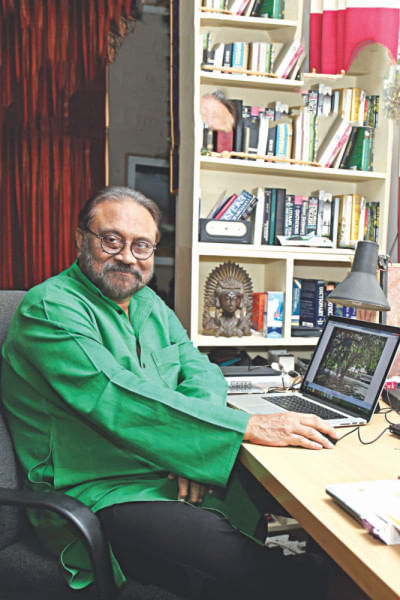When Aly Zaker was possessed by Galileo's excellence

His plan was to produce the play as a multi-group production funded by Goethe Institute, Dhaka but it somehow did not work that way. The gentleman left Bangladesh with huge frustration. However, I then took the matter up with the Goethe Institute and persuaded them to give the responsibility of production to one single theatre group and that was Nagorik Natya Sampradaya. It finally became one of the most successful productions of the group mainly because it could combine talents like Ataur Rahman as director and Aly Zaker, Khaled Khan, Lucky Enam and the likes as actors. In many ways, Galileo being my first translated work performed on the stage, has been a hugely rewarding experience of my life which is identical to what Aly Zaker said in his interview below: 'I must admit that the role of Galileo, to my assessment, is the best that I have acted in so far'. Translation of Galileo happens to be my first yet the best translation work. As a translator I have been long contemplating to interview 'my Galileo' (for I haven't seen the real Galileo) to know how he assesses the translated play and his role as Galileo. Here it is:
Abdus Selim: You have your own excellence in acting, especially stage acting. But how did you feel when you acted the character of Galileo, an academician par excellence?
Aly Zaker:I must admit that the role of Galileo, to my assessment, is the best that I have acted in so far. Well, to elaborate, I did not see this play as a mere biopic of an academician. To me it was a sensitive human being who was being examined through this play, initially, by the playwright and then by readers with sensitive minds. Therefore the role was not easy but it was a treat for an actor. I put my best foot forward.
Abdus Selim: Those were the prime days of your acting life. Did you have any stage-fright acting the powerful character of history?
Aly Zaker:No I did not. I must admit that I seldom have stage frights. This is because I never go up on stage un-prepared. And once I am ready to embark on the stage the audience becomes a non-entity. I play the role. Live in it. And be totally immersed.
Abdus Selim: Did you do any homework on Galileo before doing the character – I mean researching on the acting of Charles E. Laughton and the like?
Aly Zaker: I saw Charles Laughton's Galileo. But only just. Not in preparation for doing the role. Before that, in 1974, I saw the same play in the Berliner Ensemble. I can't remember who had done this role in that production. But when I was assigned this role I did quite a bit of research in the British Council and read as much as I could to prepare myself for the role.
Abdus Selim: Galileo Galilei is a historical character but Bertolt Brecht did not stay loyal to history, for example, Galileo had no daughter named Virginia, not to speak of her lover Ludovico Marsili or his student young Andrea Sarti. Many critics critiqued Brecht for wittingly exploiting historical facts to commensurate his own leftist political ideals. Do you think it was an appropriate move on the part of a playwright?
Aly Zaker: I knew there were some controversies about Brecht's portrayal of Galileo. But I also knew that any leftist interpretation of characters or portrayal of events could not pass without an adverse criticism of the western critics. Therefore I took the criticism of the character with a pinch of salt. I took the addition of the characters that are not on the recorded history parts as poetic license. These extra bits only added to the attraction of Brecht's work. We must not forget that the playwright was not writing history. He was penning a story based on history.
Abdus Selim: Though nobody can tell for sure if the views of Galileo on science that Brecht exposed in the discourse with Galileo's student Sarti – which has a clear left leaning – were authentic, they are detonated with issues of political dynamite for the third world people. Do you think this message has been successfully divulged among the Bangladeshi audience through your acting of Galileo?
Aly Zaker:I would attribute Brecht's dwelling on the science of Galileo as his own. They could be the outcome of research or of just imagination. While writing a play like Galileo, the author, needless to say, transposes his imagination and conviction on the subject he chooses. Brecht was no different. Here we must have a clear understanding of how the left-leaning intellectuals differed from the capitalist intelligentsia. They relate every rational work to the aspiration and wellbeing of the common man. This clearly was the reason why Galileo was so well received by our audience. They found in him their emancipator.
Abdus Selim: While performing the character of Galileo did you ever feel any affinity with his persona – both physical and mental?
Aly Zaker: Yes indeed! As a coincidence I thought the character had a big physique with a beard and I also could internalize the emotion the character bore.
Abdus Selim: Late 20th century saw the fall of communist Russia, and early 21st century sees a sudden yet definitive rise of politics of extreme fundamentalism, nationalism and populism globally. Why do you think the present audience would see Brecht's Galileo Galilei performed on the stage that radically propagates anti-religious left thinking?
Aly Zaker: I think people want a relief. They, especially in our third world, want to absolve themselves of the hegemony of the fundamentalists.
.................................................................
The writer is a theatre activist, playwright and theatre critic. He is also a Bangla Academy awardee for translation.

 For all latest news, follow The Daily Star's Google News channel.
For all latest news, follow The Daily Star's Google News channel. 



Comments